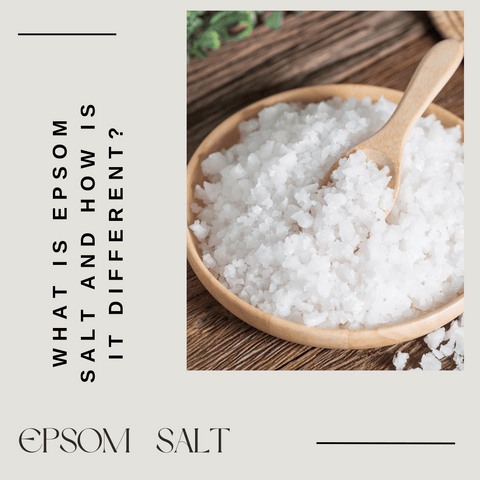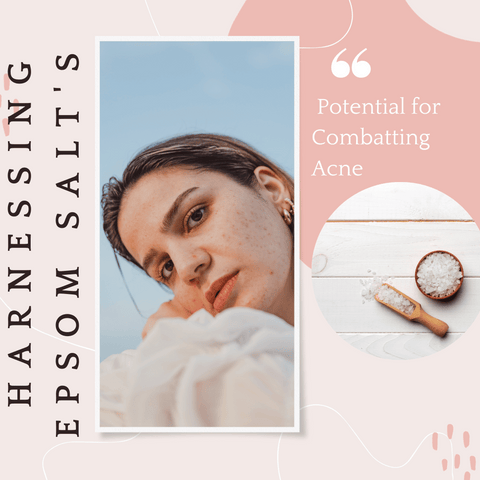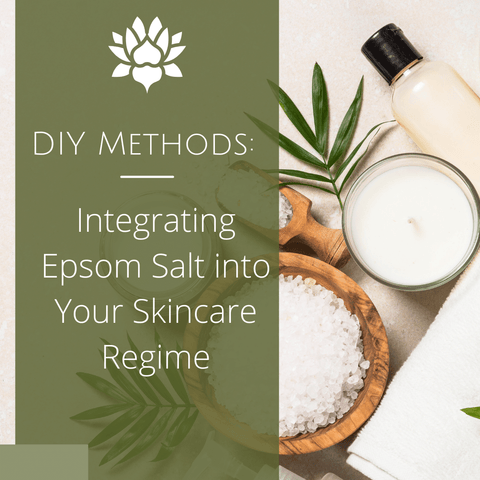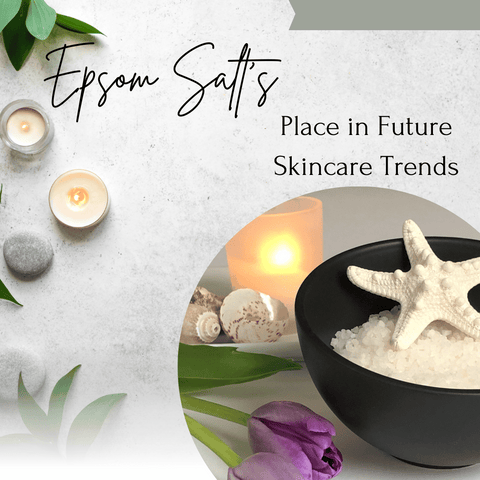Epsom salt, commonly known as magnesium sulphate, has been utilised in a range of beauty applications, including acne-fighting claims. While Epsom salt is not a standard acne treatment, some individuals feel it has qualities that may assist the skin. This blog will take a dermatological look at its acne-fighting abilities.
What is Epsom Salt and How Is It Different?

Epsom salt, commonly known as magnesium sulphate, is a magnesium, sulphur, and oxygen-containing chemical compound. It was named after the town of Epsom in Surrey, England, where mineral springs were discovered in the early 17th century. Epsom salt has a unique chemical composition that distinguishes it from other salts such as table salt (sodium chloride) and sea salt. Its distinct magnesium and sulphur content distinguishes it from regular table salt, and it is not used as a culinary condiment. If you have special health or skincare concerns about Epsom salt, always follow the suggested usage guidelines and check with a healthcare expert or dermatologist.
Tracing the Origins of Epsom Salt
Epsom salt, also known as magnesium sulphate, was discovered in natural mineral springs in the town of Epsom in Surrey, England, in the early 17th century. Epsom's mineral-rich water was discovered to have therapeutic characteristics and was used for medicinal and wellness purposes. Here's a quick rundown of Epsom salt's history, including its discovery in Epsom, England, therapeutic usage, identification of magnesium sulphate, popularity and commercialization, use in bathing and skincare, and modern applications. While Epsom salt has a long history of use for its possible medicinal advantages, scientific study on its usefulness is still underway, and not all claimed benefits have been confirmed conclusively. As with any other wellness or skincare product, use Epsom salt as directed and consult with a healthcare professional if you have any specific health concerns or conditions.
Key Components: Magnesium Sulfate's Role
Magnesium sulphate (Epsom salt) is a chemical substance having the formula MgSO4. It is made up of two major components: magnesium (Mg) and sulphate (SO4). Each of these components has a specific purpose in a variety of applications, including health, skincare, and medicine. Epsom salt contains magnesium and sulphate, which contribute to its potential medicinal and health qualities. Epsom salt is said to help relax muscles, reduce stress, boost detoxification, and enhance general well-being when used in baths or applied topically. While Epsom salt has a long history of use for these purposes, scientific study on its usefulness is still underway, and individual reactions may vary. Always use Epsom salt as directed, and consult with a healthcare professional if you have any specific health concerns or conditions.
Popular Epsom Salt Skincare Products
Because of its exfoliating and skin-soothing properties, Epsom salt is a prominent ingredient in skincare products. It's common in bath salts, scrubs, and masks. While product availability varies depending on location and brand, some popular Epsom salt skincare products include Epsom salt bath salts, Epsom salt body scrubs, Epsom salt foot soaks, Epsom salt face masks, Epsom salt creams and lotions, Epsom salt cleansers, Epsom salt body washes, and Epsom salt soaps. When selecting Epsom salt skincare products, read the product labels, follow the usage recommendations, and take into account your skin type and any unique skincare concerns you may have. Furthermore, some people may be allergic to particular components; therefore, it's a good idea to do a patch test before using new products on your skin. If you have special skincare needs or concerns, always contact a dermatologist or skincare professional.
Harnessing Epsom Salt's Potential for Combatting Acne

Epsom salt (magnesium sulphate) is largely utilised for its possible benefits in muscle relaxation, stress reduction, and skincare. While Epsom salt is not a standard acne treatment, some people believe that its exfoliating and skin-soothing characteristics may help combat acne. Here's how you can take advantage of Epsom salt's acne-fighting properties:
-
Epsom Salt Face Mask: Make a paste by combining Epsom salt and water until it reaches a thick consistency. Apply this paste to your face as a mask, avoiding the sensitive eye area. Allow it to sit for around 10-15 minutes before rinsing with lukewarm water. This can assist in exfoliating the skin, removing dead skin cells, and unclogging pores.
-
Epsom Salt Scrub: Combine Epsom salt with a dollop of your regular facial cleanser or a carrier oil like jojoba oil or coconut oil to make a light exfoliating scrub. Massage the scrub gently into your face in circular motions, concentrating on acne-prone areas. Thoroughly rinse with warm water.
-
Epsom Salt Bath: While an Epsom salt bath is not a direct treatment for facial acne, it can help relieve stress, which may lead to acne breakouts in some people. Stress reduction can help acne-prone skin indirectly.
-
Spot Treatment: Make a concentrated spot treatment by dissolving a tiny amount of Epsom salt in water. Using a clean cotton swab, apply this solution to individual acne patches. Allow it to sit for a few minutes before rinsing.
-
Be Cautious: When putting Epsom salt on your face, use caution, especially if you have sensitive or irritated skin. To guarantee that you do not have any bad effects, test a tiny patch of your skin first.
-
Consult a Dermatologist: Remember, Epsom salt is not a substitute for medically established acne treatments like benzoyl peroxide, salicylic acid, or prescription drugs. Consult a dermatologist if you have persistent or severe acne for the correct diagnosis and treatment options.
The Science Behind Epsom Salt's Effectiveness
The chemical makeup and known qualities of Epsom salt (magnesium sulphate) contribute to its potential usefulness in cosmetics and some wellness applications. While scientific research on some of its claims is still underway, below is an overview of the science underlying Epsom salt's possible effectiveness:
-
Exfoliation: Epsom salt is made up of tiny crystalline particles. When used as an exfoliant, these particles can aid in the mechanical removal of dead skin cells from the skin's surface. This procedure is critical for preserving skin health and preventing clogged pores, which can lead to acne and other skin problems.
-
Magnesium Absorption: Magnesium is a mineral that is required for several bodily functions, including muscle and nerve function. While magnesium can be absorbed through the skin, the extent to which this absorption occurs during an Epsom salt bath is still being studied. Soaking in an Epsom salt bath, according to some, may enhance magnesium levels in the body, potentially delivering calming benefits.
-
Sulfate for Skin Barrier Support: The sulphate ions in Epsom salt may help to preserve the skin's natural barrier. The skin barrier is essential for protecting the body from external irritants and pathogens. Sulphate ions can help maintain skin health by supporting barrier function.
-
Anti-Inflammatory Properties: Ions of sulphate may have anti-inflammatory effects. Inflammation is a prevalent element in skin diseases such as acne, and lowering inflammation may help reduce some of the symptoms.
-
Stress Reduction: While not directly related to skincare, stress management is an important part of overall wellness. Epsom salt baths are frequently used as a relaxation treatment, and stress reduction can benefit many aspects of health, including skin health.
It is important to remember that the utility of Epsom salt in beauty and wellness applications varies from person to person, and not all claims about its benefits have been thoroughly researched. Individual skin types and sensitivities should also be considered when incorporating Epsom salt into a skincare regimen.
Benefits Beyond Acne: Other Skincare Advantages
Beyond its possible acne benefits, Epsom salt (magnesium sulphate) provides other skincare benefits. While individual responses vary, some additional skincare benefits of Epsom salt include exfoliation, skin softening, skin detoxification, relaxation and stress reduction, anti-inflammatory properties, enhanced absorption of skincare products, skin barrier support, skin soothing, and improved circulation. Always follow the manufacturer's instructions, and if you have any negative reactions, stop using the product and consult with a dermatologist or healthcare expert. The inclusion of Epsom salt in your skincare routine can be a calming and refreshing addition to your overall skincare regimen.
Expert Recommendations: How and When to Use
Including Epsom salt (magnesium sulphate) in your skincare routine can be useful, but it's critical to follow expert advice for safe and effective use. Here's how and when to incorporate Epsom salt into your skincare routine, including Epsom salt baths, Epsom salt scrubs, Epsom salt face masks (caution), epsom salt soaks for specific skin disorders, moisturise following, skin sensitivity, visiting a dermatologist, and stress reduction baths. Remember that everyone's skin reacts differently to skincare products, so pay attention to how your skin reacts and modify your usage accordingly. To guarantee the best benefits and to reduce the risk of skin irritation, always use Epsom salt with caution and within the suggested limitations.
DIY Methods: Integrating Epsom Salt into Your Skincare Regime

Using DIY methods to incorporate Epsom salt into your skincare routine can be a cost-effective approach to reaping its potential benefits. Here are several do-it-yourself ways to incorporate Epsom salt into your beauty routine:
-
Epsom Salt Bath Soak: Allow 1-2 cups of Epsom salt to melt completely in a warm bath. Soak for 15-20 minutes in the bath, gently rubbing your skin with the salt water. Baths with Epsom salts can help to relax muscles, reduce stress, and exfoliate the skin. They are especially beneficial after a strong workout or a long, exhausting day.
-
Epsom Salt Scrub: Make a scrub by combining Epsom salt and carrier oil (such as coconut or olive oil) into a paste. Massage the scrub in circular strokes onto damp skin, then rinse with warm water. Exfoliating the skin using Epsom salt scrubs removes dead skin cells and leaves it smoother. The oil in the scrub moisturises the skin as well.
-
Epsom Salt Face Mask (Caution): To make a paste, combine a tiny amount of Epsom salt with water. Apply the paste to your face, being careful not to get it in your eyes. Allow it to sit for 10-15 minutes before rinsing with lukewarm water. Exfoliation and skin cleansing may be provided with Epsom salt face masks. As it may not be suitable for all skin types, use it with caution and restrict it to once a week or as needed.
-
Epsom Salt Compress for Acne: To make a concentrated solution, dissolve a tiny amount of Epsom salt in warm water. Using a clean cloth or cotton pad, carefully apply the solution to individual acne spots. Allow it to sit for a few minutes before rinsing with lukewarm water. Individual acne patches may benefit from Epsom salt treatments to reduce inflammation and facilitate healing.
-
Epsom Salt Foot Soak: Soak your feet in warm Epsom salt water for 15-20 minutes. Scrub your feet gently with a pumice stone to remove dead skin. Epsom salt foot soaks can smooth rough skin and ease tired, achy feet.
-
Epsom Salt Skin Detox Bath: In a warm bath, combine Epsom salt, baking soda, and aromatic oils. To encourage relaxation and detoxification, soak for 20-30 minutes. This detox bath may aid in the removal of toxins from the body and the improvement of skin health.
-
Epsom Salt Spot Treatment: To make a concentrated solution, dissolve a tiny amount of Epsom salt in warm water. Using a cotton swab, apply this solution immediately on blemishes or skin irritations. Specific skin concerns, such as acne or bug bites, can be addressed with Epsom salt spot treatments.
Crafting Epsom Salt Facial Masks at Home
Making Epsom salt face masks at home is a quick and inexpensive method to get the exfoliating and skin-cleansing advantages of Epsom salt. Here are some homemade Epsom salt face mask recipes to try:
-
Basic Epsom Salt Facial Mask: 1 tablespoon of Epsom salt and 2 teaspoons of warm water. In a small basin, combine the Epsom salt with warm water until the salt dissolves and creates a paste. Avoid the eye area by applying the paste to a clean, dry face. Allow the mask to sit on your face for about 10-15 minutes. Rinse your face with lukewarm water and pat dry. Apply your usual moisturiser after that.
-
Epsom Salt and Honey Mask: 1 tablespoon of Epsom salt and 1 tablespoon of raw honey. In a small dish, combine the Epsom salt and raw honey to make a thick paste. Apply the mixture to your clean, dry face, being careful not to get it in your eyes. Allow the mask to sit for around 10-15 minutes. Rinse with lukewarm water, pat dry, and apply moisturiser as needed.
-
Epsom Salt and Yogurt Mask: 1 spoonful of Epsom salt and 2 tablespoons of plain yoghurt (unsweetened). In a small bowl, combine the Epsom salt and plain yoghurt to make a homogeneous paste. Apply the paste to your clean, dry face, being careful not to get it in your eyes. Allow the mask to sit for around 10-15 minutes. Rinse with lukewarm water and massage your face dry before applying a moisturiser appropriate for your skin type.
-
Epsom Salt and Aloe Vera Mask: 1 tablespoon Epsom salt and 1 tablespoon aloe vera gel (unscented). In a small mixing dish, add the Epsom salt and aloe vera gel. Apply the mixture to your clean, dry face, being careful not to get it in your eyes. Allow the mask to sit for around 10-15 minutes. Rinse your face with lukewarm water, pat it dry, and then apply a moisturiser suitable for your skin type.
-
Epsom Salt and Green Tea Mask: 1 teaspoon Epsom salt and 2 teaspoons brewed and cooled green tea (unsweetened). In a small bowl, combine the Epsom salt and green tea to make a paste. Apply the paste to your clean, dry face, being careful not to get it in your eyes. Allow the mask to sit for around 10-15 minutes. Rinse with lukewarm water and pat your face dry before continuing with your normal skincare routine.
Before using any new facial mask, always perform a patch test to ensure it does not cause irritation or an unfavorable reaction. These homemade Epsom salt face masks are meant to be used on occasion and should not be used in place of your usual skincare routine. Consult a dermatologist before attempting new skincare treatments if you have sensitive or troubled skin.
Best Practices for Topical Applications
When using topical skincare products, particularly those containing Epsom salt, best practises must be followed to guarantee safety and maximise effectiveness. Here are some guidelines for topical applications:
-
Patch Test: Perform a patch test on a small area of your skin before using any new skincare product or DIY mask to check for any unpleasant reactions or allergies. Apply a small amount of the product to your inner forearm and wait 24 to 48 hours to observe if there is any redness, itching, or irritation.
-
Cleanse Your Skin: Begin with clean skin. Before applying any topical treatments, use a mild, fragrance-free cleanser to remove makeup, debris, and excess oils.
-
Be Gentle: Use gentle, upward strokes when applying items to your face or body. Avoid yanking or pushing on the skin, especially near the eyes.
-
Avoid Sensitive Areas: Apply items with caution near sensitive regions such as the eyes, lips, and mucous membranes. Some skincare components, such as Epsom salt, can irritate these areas.
-
Moisturize: After exfoliating or cleaning your skin, moisturise it to help it maintain its natural moisture balance.
-
Sun Protection: When going outside, use sunscreen with broad-spectrum protection if you are using skincare items that may increase your skin's sensitivity to the sun, such as exfoliants.
-
Follow Instructions: Always read and adhere to the product label's directions. Different products may have different usage guidelines and application frequencies.
-
Frequency of Use: Exfoliating products, especially those containing Epsom salt, should be used sparingly. Excessive use might cause skin irritation, dryness, or sensitivity.
-
Avoid Open Wounds or Broken Skin: Topical treatments should not be applied to open wounds, cuts, or regions with broken skin. Use such items only after the skin has healed.
-
Stay Hydrated: Hydration is critical for good skin. Keep your skin hydrated from the inside out by drinking plenty of water.
-
Consult a Dermatologist: Consult a dermatologist before utilising new skincare products or DIY treatments if you have specific skin issues, allergies, or skin conditions. They can make tailored recommendations.
-
Rotate Products: Consider rotating your skincare products rather than using them all at once if you use many. This can help prevent your skin from becoming overloaded with active substances.
-
Discontinue If Irritation Occurs: If you notice any redness, burning, itching, or other unpleasant reactions after using a skincare product, stop using it right away and visit a doctor.
-
Stay Consistent: In skincare, consistency is essential. It may take some time for a product's full advantages to become apparent, so stick to your skincare routine and give it some time to work.
Precautions and Potential Side Effects
It is vital to take precautions and be aware of any negative effects when using dihydroxyacetone (DHA) for sunless tanning to have a safe and happy tanning experience. Consider the following precautions and potential negative consequences:
-
The following precautions are patch test, exfoliation, dry skin, use of protective measures on hands and feet, use of gloves or mitts, ventilation, clothing, waiting before showering or swimming, and reapplication.
-
The potential side effects are streaking and uneven color, orange or unnatural color, allergic reactions, DHA smell, fading and uneven wear, and sensitivity to the sun.
If you have any concerns about utilising sunless tanning solutions, especially if you have sensitive skin or skin issues, always follow the specific recommendations provided with the DHA product you are using and consult with a healthcare expert or dermatologist.
Epsom Salt's Place in Future Skincare Trends

Epsom salt, also known as magnesium sulphate, has long been utilised for its possible skincare advantages, and its place in future skincare trends may change as consumer preferences and scientific studies advance. Here are some possible applications for Epsom salt in future skincare trends:
-
Natural and Sustainable Ingredients: Epsom salt is a naturally occurring mineral compound that corresponds to the growing trend of using natural and sustainable ingredients in beauty products. Consumers are increasingly looking for environmentally sustainable and ethically sourced items.
-
Stress Reduction and Relaxation: Epsom salt is well-known for its stress-relieving and muscle-relaxing properties when used in baths. As self-care and stress reduction become more significant in skincare routines, Epsom salt-based bath products may continue to gain popularity.
-
Exfoliation and Skin Renewal: Exfoliation is an important part of skincare, and Epsom salt's exfoliating properties may lead to its inclusion in more skin renewal and rejuvenation products.
-
Combination with Other Ingredients: Future skincare formulations may combine Epsom salt with other beneficial ingredients such as plant extracts, vitamins, and antioxidants to create products that address specific skin concerns.
-
Personalisation: Customised skincare is a growing trend, and Epsom salt may play a role in such solutions. Epsom salt is one of the ingredients used in these specialised products, which cater to the specific skin types and concerns of consumers.
-
Eco-Friendly Packaging: Skincare product packaging may become more environmentally friendly in addition to the ingredients themselves. Brands may opt for environmentally friendly packaging to complement the sustainable nature of Epsom salt.
-
Scientific Research and Validation: As scientific research into the potential benefits of using Epsom salt in skincare continues, we may see more products and claims backed up by available data, giving customers a better understanding of how Epsom salt affects the skin.
-
DIY and at-home skincare: DIY skincare has become more popular as more people experiment with homemade masks and remedies. Because of its versatility, Epsom salt is a good candidate for inclusion in DIY skincare recipes, allowing people to create personalised skincare solutions at home.
-
Skincare for Specific Conditions: Epsom salt may still be used in skincare items intended for treating particular conditions like eczema or psoriasis, where its conceivable anti-inflammatory and soothing effects on the skin may be advantageous.
-
Cleansing and detoxification: Some customers are looking for skincare products that assist the body's natural detoxification procedures. Products made to cleanse and detoxify the skin might contain epsom salt.
The continued usefulness and efficiency of Epsom salt in meeting changing consumer needs and preferences will determine its position in the coming skincare trends. As with any ingredient in skincare, it is crucial for customers to pick products carefully while taking into account their unique skin types and sensitivities.
































